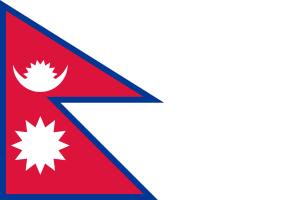Language/Nepali-individual-language/Grammar/Nouns
Hi Nepali (individual language) learners! 😊
In this lesson, we will learn about Nepali (individual language) nouns, which are essential for constructing any sentence. Nouns in Nepali (individual language) can be people, places, things, or ideas. They can be singular or plural, and they generally follow the subject-object-verb word order.
Finish this lesson and explore these related pages: Conditional Mood, Give your Opinion, Future Tense in Nepali & Noun Cases in Nepali.
Basic Concepts[edit | edit source]
In Nepali (individual language), every noun has gender assigned to it, either masculine or feminine. This designation often corresponds to the biological gender of the object being named, however, there are many exceptions. Therefore, it is essential to learn the grammatical gender of a noun along with its spelling. This way, you will know what ending to use when modifying the noun in a sentence.
For example, the word "guru" ( गुरु ) is masculine, and the word "saayani" ( सायणी ) is feminine. We use the suffixes "ko" and "sanga" for masculine and feminine, respectively, while denoting possession. For example, "Guru ko ghar" means the house of the teacher, and "saayani sanga gharma" means at home with the housewife.
Another essential part of Nepali (individual language) nouns is that they frequently function as the subject of a sentence while still allowing other parts of speech to attach to them. This quality makes sentence construction more flexible and syllable-efficient, allowing more information to be communicated per breath.
For example, in the sentence "Mero gandi bhayo" ("My elbow hurts"), "gandi" is the noun, meaning "elbow." We can modify the noun's meaning by adding adjectives or verbs to it, as in the case of "mero bhari dui gandi haru" ("my two heavy elbows"). In Nepali (individual language), adjectives come after the noun they modify.
Nepali (individual language) also has many borrowings from other languages, especially from Sanskrit, Prakrit, Hindi, and English. Some of these words have acquired Nepali grammar, while others have retained their original grammar. Notably, the loan words retain their original gender, and this property frequently does not match the gender of native Nepali (individual language) nouns.
For example, the Nepali (individual language) word for computer is "yantra," which is masculine. However, the English word "computer" ends in "er," which is often a female suffix in Nepali (individual language). This discrepancy can result in confusion and frustration for non-Nepali (individual language) speakers, so one must learn the appropriate grammatical gender of each new noun.
Types of Nouns[edit | edit source]
In Nepali (individual language), there are five types of nouns.
1. Simple Nouns[edit | edit source]
Simple nouns are a combination of a root and a suffix, sometimes without a suffix.
| Nepali (individual language) | Pronunciation | English |
|---|---|---|
| सिंह | singha | lion |
| घर | ghar | house |
| शिक्षक | sikshak | teacher |
2. Compound Nouns[edit | edit source]
Compound nouns are formed by combining two or more simple nouns. Compound nouns can be joint or hyphenated.
| Nepali (individual language) | Pronunciation | English |
|---|---|---|
| चलचित्र | chalachitra | movie |
| टेलिफोन कक्ष | telefon kaksha | telephone booth |
| गुरुकुल | gurukula | school for spiritual study |
3. Collective Nouns[edit | edit source]
Collective nouns are words used to describe groups of people, animals, or things.
| Nepali (individual language) | Pronunciation | English |
|---|---|---|
| समूह | samuha | group |
| चलचित्र-दल | chalachitra-dala | film crew |
| सृष्टिकर्ता | srshtikarta | Creator |
4. Abstract Nouns[edit | edit source]
Abstract nouns refer to ideas, concepts, or emotions that cannot be physically perceived.
| Nepali (individual language) | Pronunciation | English |
|---|---|---|
| स्वास्थ्य | swasthya | health |
| समाज | samaj | society |
| आत्मनिर्भरता | atmanirbharta | self-reliance |
5. Nouns derived from Verbs[edit | edit source]
Nouns derived from verbs are formed with the help of suffixes or modification of the root word.
| Nepali (individual language) | Pronunciation | English |
|---|---|---|
| लेखन | lekhan | writing |
| भोजन | bojhan | food |
| फोहरमाछा | phoharamacha | hunter |
Dialogue[edit | edit source]
Person 1: तपाईंको नाम के हो? (Tapaiṅko naam ke ho?) (What is your name?) Person 2: मेरो नाम घीष्मा हो। (Mero naam ghishma ho.) (My name is Ghishma.)
Person 1: तपाईं स्कुलमा कहाँ पढ्दै हुनुहुन्छ? (Tapaiṅ skulama kahāṅ paḍhda'i hunu hunchha?) (Where do you go to school?) Person 2: बरौँ देशको शहरमा। (Barauṁ deśako śaharama.) (In the city of Bara.)
Person 1: तपाईंको समुदाय के हो? (Tapaiṅko samudaaya ke ho?) (What is your community?) Person 2: मैती ठाकुरी हो। (Maiti Thakuri ho.) (I'm a Thakuri from the Maiti community.)
Sources[edit | edit source]
➡ If you have any questions, please ask them in the comments section below.
➡ Feel free to edit this wiki page if you think it can be improved. 😎
Other Lessons[edit | edit source]
- How to Use Be
- Conditional Mood
- Pronouns
- Questions
- Verbs kriyaharu क्रियाहरू
- Gender
- Adjectives
- Future Tense
- Give your Opinion

